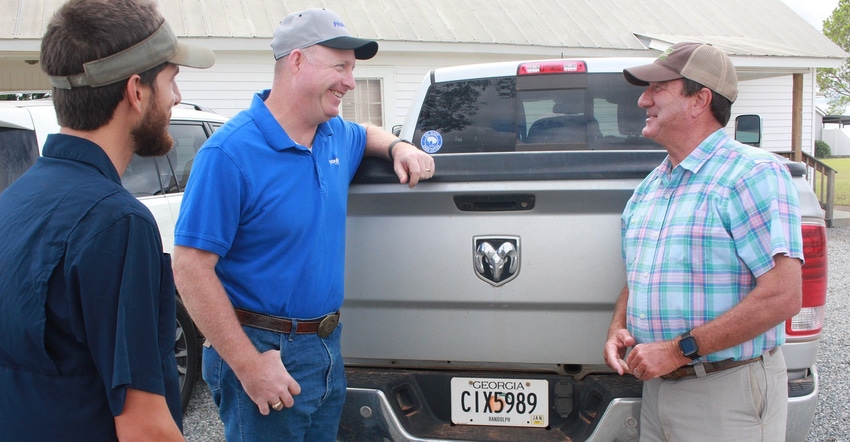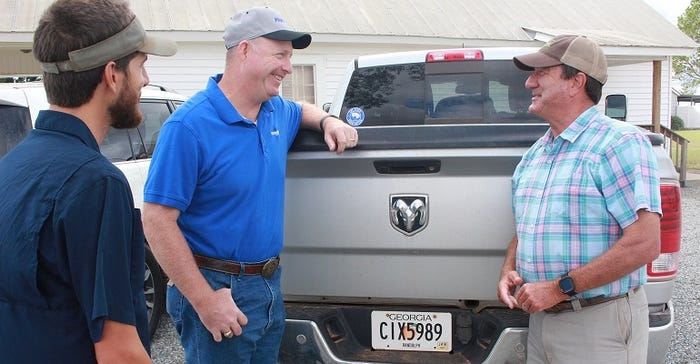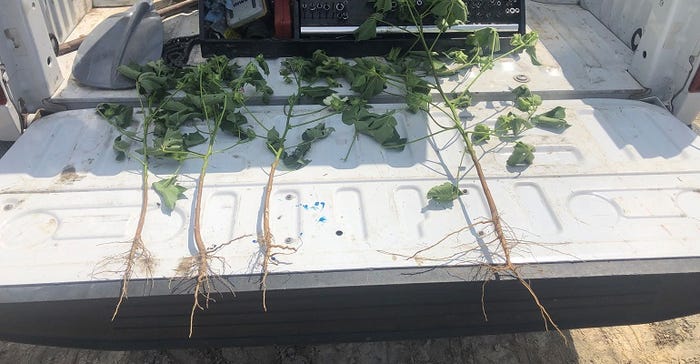February 1, 2020

Sponsored Content
When it comes to cotton pests, don’t let out of sight mean out of mind.
While resistant weeds are easy to spot from the turnrow, root-knot nematodes lie in the soil, often unidentified until plants show symptoms. These parasitic roundworms have a significant economic impact and shouldn’t be overlooked.
According to Extension estimates, root-knot nematodes cost U.S. cotton producers as much as 628,600 bales per year, or $200 million if cotton is 65 cents per pound. The pest is prolific in southeastern states, especially in Georgia, where annual losses are estimated as high as $57 million.1
This economic impact could be on the downturn with the advent of highly resistant root-knot nematode varieties from PhytoGen. All of the newest PhytoGen® W3FE varieties adapted for the Southeast come with the PhytoGen Breeding Trait™ for root-knot nematode resistance.
PhytoGen leads the industry with root-knot nematode resistance currently available in varieties such as PhytoGen® brand PHY 350 W3FE, PHY 400 W3FE, PHY 480 W3FE, PHY 500 W3FE and PHY 580 W3FE. This level of resistance significantly reduces the ability of RKN to gall, reproduce or survive. This lowers field populations of RKN each season.
“PhytoGen Breeding Traits are native — or naturally occurring — traits, so yield potential is protected throughout the season for greater yield consistency,” said Russell Nuti, Ph.D., PhytoGen Cotton Development Specialist who covers parts of Georgia, Alabama and Florida. “This root-knot nematode protection doesn’t wash off or become less effective over time like crop protection products.”
That’s big news for Southeast cotton producers with sandier soils that root-knot nematodes love to call home. Nuti said many growers have seen unimaginable yield gains in fields they had long ago written off due to root-knot nematodes.

Ken Hall, of Poulan, Georgia, has root-knot nematodes on a substantial amount of his cotton acres. He’s tried several management strategies through the years — from rotational nonhost crops to crop protection applications. With resistant varieties from PhytoGen, Hall has dramatically increased yields on heavily infested root-knot nematode fields.
“I have a farm that was yielding about 900 pounds per acre with one of the top nonresistant varieties on the market, but we planted a PhytoGen variety with two-gene root-knot resistance in 2019,” Hall said. “The field was more uniform with better plant height, and it made 1,200 pounds to the acre, so we’re looking at a 300-pound increase.”
Austin Warbington, a cotton producer from Vienna, Georgia, said most fields in his area have root-knot nematodes, so resistant varieties provide a major benefit to him as well. In addition to yield protection, Warbington said the resistant varieties allow him to better steward the land by reducing nematode populations and keeping land productive.
“We can plant these varieties on fields with root-knot nematodes, and it’s almost like planting a rotational crop because we eliminate up to 90% of the nematode population,” Warbington said.
Throw in the kitchen sink
Root-knot nematode protection may help against the $200 million pest, but what about other threats, such as resistant weeds, bollworms and bacterial blight? Shawn Butler, Ph.D., PhytoGen Cotton Development Specialist in eastern Georgia, said PhytoGen offers the industry’s best and broadest yield protection package.

“All of our newest varieties come with WideStrike 3 Insect Protection and the Enlist cotton trait, so you get three-gene Bt protection and the elite Enlist weed control system that fits with 2,4-DB often used in our peanuts,” Butler said. “Plus, every PhytoGen W3FE variety is resistant to bacterial blight ― you can check that problem off the list.”
Butler credits PhytoGen leadership and breeding teams with a dedicated effort to bring in-plant solutions to help Southeast producers thrive in cotton. The company’s focus on yield protection is evident in the consistent variety performance in recent years.
“This is a very exciting time at PhytoGen as far as cotton varieties and technologies — they just keep getting better and better,” Butler said. “These new PhytoGen W3FE varieties are what I call ‘kitchen sink’ varieties, because we put so much in the seed — everything but the kitchen sink.”
For more information on PhytoGen W3FE varieties, WideStrike® 3 Insect Protection and PhytoGen Breeding Traits, go to www.PhytoGen.com.
Footnote:
1K.S. Lawrence, et al. 2018. Cotton disease loss estimate committee report, pp. 161-163. In Proceedings, Beltwide Cotton Conferences, 3-5 January 2018, San Antonio, Texas.
™ ® Trademarks of Dow AgroSciences, DuPont or Pioneer, and their affiliated companies or their respective owners.
About the Author(s)
You May Also Like




